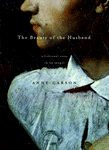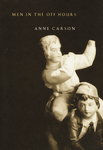|
|
 |
|
|
 |
 |
 |
 |
"Tango II"
from THE BEAUTY OF THE HUSBAND
II. BUT A DEDICATION IS ONLY FELICITOUS IF PERFORMED BEFORE WITNESSES--IT IS AN ESSENTIALLY PUBLIC SURRENDER LIKE THAT OF STANDARDS OF BATTLE
You know I was married years ago and when he left my husband took my notebooks.
Wirebound notebooks.
You know that cool sly verb write. He liked writing, disliked having to start
each thought himself.
Used my starts to various ends, for example in a pocket I found a letter he'd begun
(to his mistress at that time)
containing a phrase I had copied from Homer: ... is how Homer says
Andromache went
after she parted from Hektor--"often turning to look back"
she went
down from Troy's tower and through stone streets to her loyal husband's
house and there
with her women raised a lament for a living man in his own halls.
Loyal to nothing
my husband. So why did I love him from early girlhood to late middle age
and the divorce decree came in the mail?
Beauty. No great secret. Not ashamed to say I loved him for his beauty.
As I would again
if he came near. Beauty convinces. You know beauty makes sex possible.
Beauty makes sex sex.
You if anyone grasp this--hush, let's pass
to natural situations.
Other species, which are not poisonous, often have colorations and patterns
similar to poisonous species.
This imitation of a poisonous by a nonpoisonous species is called mimicry.
My husband was no mimic.
You will mention of course the war games. I complained to you often enough
when they were here all night
with the boards spread out and rugs and little lamps and cigarettes like Napoleon's
tent I suppose,
who could sleep? All in all my husband was a man who knew more
about the Battle of Borodino
than he did about his own wife's body, much more! Tensions poured up the walls
and along the ceiling,
sometimes they played Friday night till Monday morning straight through, he
and his pale wrathful friends.
They sweated badly. They ate meats of the countries in play.
Jealousy
formed no small part of my relationship to the Battle of Borodino.
I hate it.
Do you.
Why play all night.
The time is real.
It's a game.
It's a real game.
Is that a quote.
Come here.
No.
I need to touch you.
No.
Yes.
That night we made love "the real way" which we had not yet attempted
although married six months.
Big mystery. No one knew where to put their leg and to this day I'm not sure
we got it right.
He seemed happy. You're like Venice he said beautifully.
Early next day
I wrote a short talk ("On Defloration") which he stole and had published
in a small quarterly magazine.
Overall this was a characteristic interaction between us.
Or should I say ideal.
Neither of us had ever seen Venice.
Excerpted from The Beauty of the Husband by Anne Carson. Copyrightę 2000 by Anne Carson. Excerpted by permission of Knopf, a division of
Random House LLC. All rights reserved. No part of this excerpt may be reproduced or reprinted without permission in writing from the publisher.
|
|
 |
 |
 |
|
A portion of "Irony Is Not Enough: Essay On My Life as Catherine Deneuve (2nd draft)"
from MEN IN THE OFF HOURS
saison qui chante saison rapide
je commence
Beginnings are hard. Sappho put it simply. Speaking of a young girl Sappho said, You burn me. Deneuve usually begins with herself and a girl together in a hotel room. This is mental. Meanwhile the body persists. Sweater buttoned almost to the neck, she sits at the head of the seminar table expounding aspects of Athenian monetary reform. It was Solon who introduced into Athens a coinage which had a forced currency. Citizens had to accept issues called drachmas, didrachmas, obols, etc. although these did not contain silver of that value. Token coinages. Money that lies about itself. Seminar students are writing everything down carefully, one is asleep, Deneuve continues to talk about money and surfaces. Little blues, little whites, little hotel taffetas. This is mental. Bell rings to mark the end of class. He has a foreskin but for fear of wearing it out he uses another man's when he copulates, is what Solon's enemies liked to say of him, Deneuve concludes. Fiscal metaphor. She buttons her top button and the seminar is over.
Jours
If you asked her Deneuve would say Take these days away and pour them out on the ground in another country.
Parts
Seminar meets MonWedFri. Parts of time fall on her and snow wanders slowly through the other afternoons. Deneuve sits in her office looking at the word irony on a page. Half-burnt. You have to wonder. Sappho, Sokrates, is it all mental? These people seem bathed in goodness, yet here come the beautiful dangerous white rapids beating onto them. Knife of boy. Knife of girl. Knife of the little knower. Where is the ironic work that picks threads back from that surface into another design underneath, holding rapids in place? Evening fills the room. Deneuve buttons her coat and closes the office door behind her. Staircase is dim and filthy, small dirty deposits on each step. She heads for the Metro. What would Sokrates say. Name the parts. Define each name. Deneuve is turning names and parts over in her mind when she realizes she has ridden the train four stops in the wrong direction. Climbs back up from the platform, stairs are filthy here too, must be a punishment. Hip slams hard into the metal arm of the turnstile. Red sign pasted on it says NO EXIT. Sound is far away. All around her strange lamps burn brightly and human tongues press the night.
Weekends
Weekends are long and white. Snow drifts against the door. Distant threads from the piano downstairs. Deneuve washes her glassware. Dries it. Hours slide. In the hotel room it is dusk, a girl turns, I have to confess something. This is mental. Two parallel red lines of different lengths inch forward, not touching.
Excerpted from Men in the Off Hours by Anne Carson. Copyrightę 2000 by Anne Carson. Excerpted by permission of Knopf, a division of
Random House LLC. All rights reserved. No part of this excerpt may be reproduced or reprinted without permission in writing from the publisher.
|
|
 |
|
|
|




